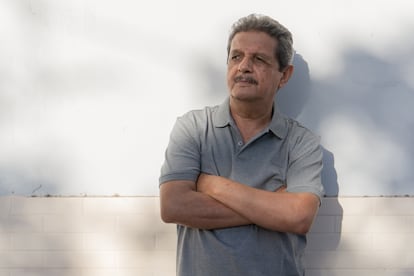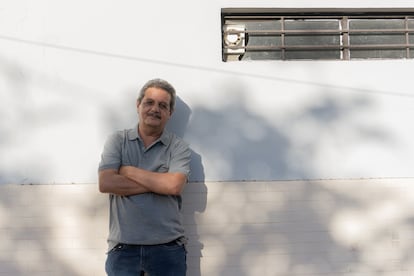‘The Italian mafia’s best students aren’t the Colombians, they’re the Mexicans’
Ismael Bojórquez, editor of the weekly newspaper ‘Ríodoce’ in Sinaloa, says that the narco and corruption have infiltrated all of society in Mexico


Sinaloa is synonymous with El Chapo Guzmán, narcotrafficking and terror. In Culiacán, the capital of the Mexican state, an open door and a bare staircase lead to the headquarters of Ríodoce, the newspaper founded by Ismael Bojórquez. It is a modest space with polished stone floors, a few computers and piles of dusty newspapers. The weekly newspaper is about to mark 20 years of denouncing the rot of corruption and violence. It was the workplace of the internationally acclaimed journalist Javier Valdez, who was on his way to the office when he was shot and killed in 2017. He became a symbol of all the journalists killed in the country. Posthumous homages to Valdez still abound, and reporters hold up his image as a referent for their ongoing struggle. Bojórquez continues to fuel the fire of Valdez’s memory. Five journalists continue to work in the Ríodoce office. Below on the street, as Bojórquez poses for photos, everyone seems suspicious: the man eating a sandwich in a dilapidated black car; the driver that speeds past; the workers sitting on the sidewalk. The handgun could appear at any moment.
Question. Mexico is tragically known for the murders of journalists. There have been nine this year so far, and the country is about to break a record. How have we gotten here?
Answer. This evolved along with the narcoviolence. A significant part of crimes are committed by the narcos in coordination with politicians or vice-versa. This problem didn’t exist 20 years ago, but everything got worse with the death of Francisco Ortiz Franco in Tijuana, and Alfredo Jiménez Mota’s disappearance a year later. He worked with me at Noroeste. Everything started to devolve for the press then. In Tamaulipas, in Veracruz, nothing could be published that wasn’t authorized by the narco, not even a death. That’s when the concept of silent zones started to develop. Publishing information could cost you your life. Impunity motivated many of those murders. And we’re still in the same place. With Andrés Manuel [López Obrador, the current president], we were hopeful, but things are even worse, with the added aggravation that the president is complaining about the media all the time, a permanent aggression that adds to this context of impunity for violence against journalists. The government observes that in 45% of crimes someone from the state is involved: municipal police, mayors, officials, a devious local politician. That explains the levels of impunity. If someone who sits at the decision-making table, or a representative who’s looking to get to Congress, is involved, the investigation in the prosecutors’ offices doesn’t move forward.
Q. Who is winning the war?
A. The press isn’t winning, nor is the freedom of speech. The narco is winning. When the media stays quiet, they achieve their goal. There’s no general conspiracy by organized crime to silence the press. They are cases that, put together, give you a general panorama. Now there is less reporting on the street, because people are afraid to go out, and they’re horribly paid.
Q. Why are people still doing journalism in Mexico?
A. Almost everyone does other things. They’re taxi drivers, or riders on motorcycles who take a photo and sell it. Or they work simultaneously for three media outlets. There is a real problem of labor abuses that hasn’t been addressed. The narrative has focused on the insecurity, but there is also frightening abuse by media outlets that have a lot of money while the journalists don’t even have social security.
Q: Why did you become a journalist?
A: I started when I was old, in 1990. I was really involved in the left, in the revolutionary struggle, but the Berlin wall fell and I found my trenches in journalism. I love the profession.
Q: How do you see the immediate future?
A: We don’t see this as inevitable. This didn’t exist three decades ago, so it doesn’t have to be like this forever. There need to be ways for journalists to work safely, but that’s true for any profession. In Mexico, more journalists and taxi drivers and women and lawyers are killed than journalists. We need public policy. Crime is not being fought. Andrés Manuel says that we have to go to the root causes. For him, that means giving 3,000 pesos [€142] to a working-class person, but it turns out that if you follow a military convoy, behind them there are three or four men on motorcycles, without license plates, with their radios, warning the narco boss where the convoy is going. These are the people receiving those 3,000 pesos from the president, and that doesn’t make them stop working for the cartel as well. The root causes need to be attacked, yes, but crime needs to be fought right now. We need a holistic policy. Andrés Manuel preferred hugs over bullets, and these three years have been like a truce for the narco. During truces, armies re-arm themselves and reorganize.

Q. Are there any political parties that are harder on crime?
A. All of them have adapted. This started 80 or 100 years ago. The revolutionary governments also benefited from the narco, in the 1950s, in the 1960s. It was the era of opium gum, heroin, marijuana. In past elections, in Sinaloa, the PRI tried to kidnap the Morena candidates and the Morena candidates kidnapped the PRI in two towns. We reported on that. Everyone is deep into the shit. No one is outside of it.
Q. This reality seems to be making Mexicans pessimistic.
A. The panorama is devastating. I don’t want to lose hope, because you become useless, but it is devastating.
Q. In this power-play between politicians, the justice system, the narco, businesspeople, is the Church free of the rot?
A. No. There are churches built by drug lords. When the film The Crime of Father Amaro came out in 2002, a boy passed out flyers here in Culiacán to tell people not to go to the movies. The priest Ernesto Álvarez, now dead, took Amado Carrillo Fuentes [the drug trafficker nicknamed the Lord of the Skies] to a Via Crucis in Jerusalem.
Q. So nobody is clean.
A. There is not a single sphere in society that isn’t infiltrated by the narco. Not one. The main library in Culiacán is the central library of the UNAM university. It was built in part with money from [drug tzar] Miguel Félix Gallardo. Everything is infiltrated, the economy, agriculture, the electoral processes.
Q. You don’t have a bodyguard.
A. No, they offered me one when Javier was killed and I am grateful for that. I have this panic button. But whenever they want to do something, they’re going to do it. I like my freedom too much. A bodyguard would take it away.
Q. What’s happening is like the Italian mafia.
A. The Italian mafia’s best students aren’t the Colombians, they’re the Mexicans. We have this dynastic, family aspect, the way they’ve gotten into the public spending. They don’t just go after drug money anymore, now they put people in government agencies so they can get to the treasury. This is really common, and that idea comes from Italy. The cartel wants to control the police, because that’s basic, but now they also want to control the head of public works, the city treasurer and the human resources official, because they will then put 20 of your guys on the payroll, the city will pay them and they will watch the corners for you.
Q. In Mexico, there are hundreds of journalists who are heroes, who are putting their lives at stake for four pesos. Then there are others who are embarrassing to hear in the president’s daily press conferences, praising him endlessly and attacking their journalist colleagues. Is there any middle ground?
A. The press in Mexico was distorted in the 1940s and 50s thanks to government bribes. Government allowances became part of the system, and they were used to weaken journalism, mostly with the PRI but also later. That’s clear now with those people at the press conferences. It hasn’t changed with Andrés Manuel.
Q. Are there journalists within the narco too?
A. There are a lot. They start going undercover with the police, then they get involved, then they want to carry a gun. Even though they’re not narcotraffickers, they receive payments from the narco.
Q. And do they get killed too?
A. Yes, a lot of them. I don’t dare to say which, but there must be cases in which they’re killed because they’re involved in the organization.
Q. What do you think of when I say the word narco?
A. Corruption. Pyramidal organizations don’t really exist anymore. They are families, yes, but the narco is now more horizontal. Everyone could be involved in it. Some of the last families that you’d expect are now involved in it. They have co-opted everything.
Q. There are television series where the narcos are the handsome ones, the good guys. It’s a good whitewashing of their image.
A:.Those who make TV shows are trying to make money. It’s their job.
Q. Shouldn’t someone say something to them?
A. And who would do it?
Q. Journalists?
A. [laughs]
Q. You said that these times remind you of the birth of Ríodoce, almost 20 years ago.
A. Yes, because Ríodoce was founded under a very authoritarian Sinaloan government led by Juan Millán. He liked to control the press. He boasted about that. One of his officials told me one that Millán’s strategy was to make the press die of hunger, the same thing that Alejandro Moreno, the leader of the PRI, has said in audio recordings that are going around.
Tu suscripción se está usando en otro dispositivo
¿Quieres añadir otro usuario a tu suscripción?
Si continúas leyendo en este dispositivo, no se podrá leer en el otro.
FlechaTu suscripción se está usando en otro dispositivo y solo puedes acceder a EL PAÍS desde un dispositivo a la vez.
Si quieres compartir tu cuenta, cambia tu suscripción a la modalidad Premium, así podrás añadir otro usuario. Cada uno accederá con su propia cuenta de email, lo que os permitirá personalizar vuestra experiencia en EL PAÍS.
¿Tienes una suscripción de empresa? Accede aquí para contratar más cuentas.
En el caso de no saber quién está usando tu cuenta, te recomendamos cambiar tu contraseña aquí.
Si decides continuar compartiendo tu cuenta, este mensaje se mostrará en tu dispositivo y en el de la otra persona que está usando tu cuenta de forma indefinida, afectando a tu experiencia de lectura. Puedes consultar aquí los términos y condiciones de la suscripción digital.








































